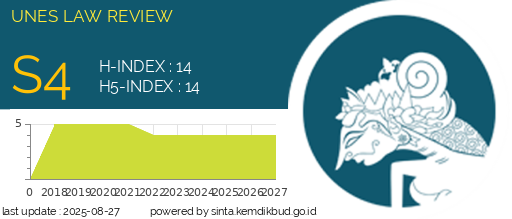Urgensi Penguatan Ketentuan Hukum Perlindungan Konsumen Pasca Diterapkan Sistem Perdagangan Bebas di Indonesia
DOI:
https://doi.org/10.31933/unesrev.v6i1.1043Keywords:
Strengthening, Consumer Protection, Free TradeAbstract
Law Number 8 of 1999 Concerning Consumer Protection (UUPK) states that consumer protection is all efforts that guarantee legal certainty to provide protection to consumers. As consumers, the public is often in a weak position, one of the causes of this weakness is the weakening of power in regulating and supervising consumer rights. Currently, free trade supported by advances in communication technology has ecpanded the space for the flow of transactions of goods and/or services between countries, this condition, on the one hand, has benefits for consumers because all consumer needs can be met, as well as more freedom to choose various types of quality goods and services according to the wishes and abilities of consumers. However, on the other hand, such conditions can result in the consumer’s position being in a weak position and consumer protection rules that are no longer sufficient to keep up with the developments and sophistication of the times. Everything related to the purchase of goods/services regulates consumer rights. But in fact, currently consumer protection provisions are unable to act as a legal umbrella in the era of free trade with the existence of business actors who do not pay attention to consumer rights. Strengthening consumer protection in Indonesia after free trade is absolutely necessary to provide protection to the public and create a balance between business and consumers. Efforts to improve consumer protection by amending the UUPK, strenghthening consumer protection institutons, providing consumer education and a commitment to establising laws and regulations that protect consumers.
Downloads
References
Barkatullah, Abdul Halim. Hak-Hak Konsumen. Nusamedia, 2019.
Diphayana, Wahono. Perdagangan Internasional. Deepublish, 2018.
Febriansyah, Ferry Irawan. “Keadilan Berdasarkan Pancasila Sebagai Dasar Filosofis Dan Ideologis Bangsa.” DiH: Jurnal Ilmu Hukum 13, no. 25 (2017): 368780.
Hakim, Lukmanul. “Tanggung Jawab Produsen Dalam Perdagangan Bebas.” Among Makarti 3, no. 2 (2012).
Hamid, Abd Haris, and MH SH. Hukum Perlindungan Konsumen Indonesia. Vol. 1. SAH MEDIA, 2017.
Kristiyanti, Celina Tri Siwi. Hukum Perlindungan Konsumen. Sinar Grafika, 2022.
Sidabalok, Janus. “Hukum Perlindungan Konsumen Di Indonesia.” Bandung: Citra Aditya Bakti, 2006.
Sunandar, Taryana. Ratifikasi Konvensi Perdagangan Bebas (WTO). Jakarta: BPHN Kementerian Kehakiman, 1999.
Susanto, Happy. Hak-Hak Konsumen Jika Dirugikan. Visimedia, 2008.
Tuela, Marcelo Leonardo. “Upaya Hukum Perlindungan Konsumen Terhadap Barang Yang Diperdagangkan.” Lex Privatum 2, no. 3 (2014).
Windari, Ratna Artha. “Pertanggungjawaban Mutlak (Strict Liability) Dalam Hukum Perlindungan Konsumen.” Jurnal Komunikasi Hukum (JKH) 1, no. 1 (2015).
Kemendag, AHKFTA, https://ftacenter.kemendag.go.id/ahkfta
Downloads
Published
How to Cite
Issue
Section
License
Hak cipta :
Penulis yang mempublikasikan manuskripnya di jurnal ini menyetujui ketentuan berikut:
- Hak cipta pada setiap artikel adalah milik penulis.
- Penulis mengakui bahwa UNES Law Review berhak menjadi yang pertama menerbitkan dengan lisensi Creative Commons Attribution 4.0 International (Attribution 4.0 International CC BY 4.0) .
- Penulis dapat mengirimkan artikel secara terpisah, mengatur distribusi non-eksklusif manuskrip yang telah diterbitkan dalam jurnal ini ke versi lain (misalnya, dikirim ke repositori institusi penulis, publikasi ke dalam buku, dll.), dengan mengakui bahwa manuskrip telah diterbitkan pertama kali di Jurnal UNES Law Review.



















